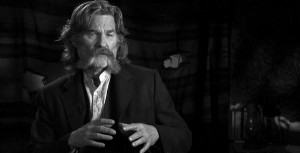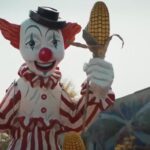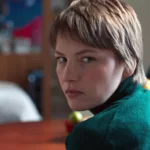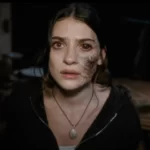Kurt Russell is back on the big screen as the star of the new Quentin Tarantino film, The Hateful Eight. Russell’s professional life is full of highs from being Disney’s biggest star of the 1970’s, through to starring in the likes of Silkwood, Escape From New York and Tarantino’s Grindhouse feature Death Proof.
He began his career by kicking Elvis Presley in It Happened At The World‘s Fair and later played him in the bio-pic Elvis. Russell was in Australia recently to promote The Hateful Eight.
Sean Sennett caught up with the actor to find out about filming with Tarantino right through to settling the urban tale that Walt Disney’s last scrawled words on his death bed were in fact ‘Kurt Russell’.
I was just watching Vanilla Sky last night, one of my favourite movies. And of course, you’re in it.
Yeah, it’s an interesting retake on a greatfilm I loved, the Spanish movie; Abre los Ojos was fantastic. It was really interesting to get the opportunity to work with Cameron (Crowe) and Tom (Cruise) on that, and do their take on it. I’d never played a character like that (a psychologist). It was a lot of fun.
I love that line you say in there about Lennon and McCartney. I thought that was very apt… when you’re a young guy you like Lennon; when you get older and have kids you start liking McCartney. I think that’s true.
Yeah, right, that’s right (laughs)
Congratulations on the Hateful Eight. You must be very happy the way it’s turned out.
Yeah, I really was. Whenever you work with Quentin you know you’re going to have a unique experience, and also you know that you’re going to be given the opportunity to create a great character. And in this case, I was in there with a great group of actors to do that, and tell a really interesting story. And then it’s always fun to work with Quentin because you’re going to shoot a lot of stuff that’s not going to end up in the movie, and it’s interesting to see what is going to make it, what he’s going to use.
But what is interesting is no matter what he does or doesn’t use it’s a great version of what you read, of what you thought you were doing. It’s a great version of the character you thought you were going to play. It’s got a lot of what it was you thought you were doing. And sometimes when you make movies you end up watching the movie going well, okay, it’s whatever, but I think you totally missed the boat on the stuff we talked about, just because you couldn’t cut this together a certain way. It’s very pleasing. You’re right; it’s very nice to like the outcome of something you worked hard on, that you really believed in.
There’s such great characters in the film. I know you were involved in the early reading of the script. Were you always going to play this character?
According to Quentin that was the case. He was hearing that voice, my voice as he was constructing the character. I don’t know exactly what that means and I never asked him, but I just got a phone call from him one day that he was going to do a reading of a script that he wrote. And I said sure, you want me to jump in there. He sent it to me. I read. I knew right away I had a take on John Ruth that he liked.
We actually ended up doing it in front of a large audience of about 1,500 people on a stage. Then he decided to make the movie. So that’s the chronological order of how it went. Now he does talk a little bit about the possibility of doing this as a play which I think would be a lot of fun. It would be a great project and a lot of fun to do.
You mentioned things that were left out of the final edit. Was there anything missing that you thought might have been in there? Or was the ending different to what you anticipated?
Yeah, there’s a lot of things, but like I said; it doesn’t affect the feeling that you have about the movie that you thought you were doing. It doesn’t affect that. It’s all there. No, there’s things in there that big chunks of things that we shot that are not there. That’s just what Quentin does. That’s the way he shoots. I love that because in his hands you have confidence that again the best version he can do is what you’re going to end up with.
It was wonderful to hear Morricone’s score in there, even though some of the music had been used elsewhere. You’ve been in some amazing westerns and people often site you as being one of “the guys” in westerns. Do you have a western that’s your favourite?
The movies that I appreciate the most, or the two that I like the best are Once Upon a Time in the West and The Man Who Shot Liberty Valance. Those are my two favourite westerns. I was fortunate in that I did westerns when I was a young guy, and I played some really fun characters, especially in The Quest. And then Tombstone was a really interesting experience. I loved what Tombstone presented in terms of impact. I was just reading recently the 25 best westerns ever made and it was number 7. I thought that’s moved up the list, definitely.
This year I got the opportunity not just to do Hateful Eight but also a picture called Bone Tomahawk, which was really a unique screenplay. I was really happy to be able to be a part of getting that made and the movie done. There’s some really great stuff in that movie, so yeah, I feel very comfortable in that environment. I love it when you read a period piece that you really feel there’s strength to, I look forward to doing it. It’s a world I feel comfortable in.
When Quentin first approached you about the Grindhouse film Death Proof, did you need much convincing or did you read the script and thought you wanted to be in that movie?
At that point, I had met Quentin in my life but I didn’t know him. I read it and thought ‘oh, this is fun’. I understand why Quentin’s doing it. I began to learn about Quentin’s love for the history of our business and actors in it. I quickly understood why he looked my way.
But then as I got to working with him, I realized also he’s a completely cinephile, and he knew more about my career than I did, and how it fit what he was doing. Then it was time to work together, and boy, it’s just as fun of an experience as you can have on a set. I mean, I’ve worked with great directors, but I have to say I don’t know if I’ve ever worked with anybody who enjoys the process as much as Quentin does.
He loves what he does. And he loves sharing it, and he loves sharing itand he wants that ball handed back. He wants to play. It’s a big sandbox and he really wants to have fun. He really wants to create something great. He really cares about the result of his projects, and he loves actors. You get treated well as someone who’s striving to do something. All he asks for is somebody who wants to do it as badly as he does.
I think he kind of puts himself with those people who are relaxed, and interested in what he’s doing, but also are ready to go to work. You’re ready to work, work, work. It doesn’t matter how long it takes. When he finds those people he has a tendency to stick with them.
You’re used to working hard. Your CV kind of links back to old Hollywood and the amount of stuff you’ve done. Quentin is a great filmmaker. You have worked with at least one genius in your life. Just from a small boy’s perspective, how did you feel about Walt Disney when you met him?
I was a young guy. I was 13-years old and he reminded me a great deal of my grandfather. But I did have a chance to spend time with him. We used to play Ping-Pong sometimes at lunch. He used to come down sometimes when I was not working, but was going to be working later on. I had a couple of hours off and was done with school for the day. He would take me to different departments, and meet the department heads, and explain to me and show me around.
He once took me to the animation department and I ended up with a bunch of really cool cells that he gave me. He talked to me about a lot of things. I was a ball player and he knew that I was serious about it. He said, “If baseball turns out not to be what you do in your life, maybe this is a world that you should look at. I think you’d find this interesting. I think there’s more here at this time in your life, than you know. It’s something you could get very interested in.”
Of course, at that time I didn’t chalk it up to anything other than a really very cool guy who reminded me of my grandfather. I recently was sent a framed copy of a letter that I wrote him in thanks when we went to Disneyland, my family and I. It was very interesting to read it. They have the original which they found recently in his archives. They have that one framed. It’s interesting because I wrote it when I was 13 or 14. You can see the relationship there.
You can see there’s a great deal of respect, and some friendship. I did get to work with him and feel that this is a man who created a whole world that didn’t exist before he created it. Then there’s guys who you get to work with who are just so clever at what they do that if they aren’t geniuses they come pretty close.
The mystery of why Walt wrote your name on a piece of paper has never been solved, has it?
No. I was taken in there a couple of years after he died, and shown the office, and at the time it was kept the way it was. There was a woman I don’t know who she was. I don’t know if it was his secretary or who it was, but I was shown around the office by this woman. She pointed to that piece of paper and said, “This is evidently the last thing he wrote, and do you know why your name would be here? Do you know what that is?” And I said, “No, I don’t. I’m sorry, but I don’t know what it was about.” That urban tale is a reality. I don’t know what it was he was thinking of.
You’ve played some great American characters. As a kid growing up, the Elvis film was terrific. You’ve gone back to Elvis a few times since then. Can you ever see another Elvis project on the horizon for you?
No. As a matter of fact, Elvis in and of itself was full on. As a favour to Bob Zemeckis, he wanted to revoice the actor he was using on Forrest Gump. I said sure, let’s do it uncredited because I thought that was the way to do it. Then it was 3,000 Miles to Graceland, which I thought was a sweet story that I wasn’t real proud of the outcome of, but I do realize it’s different.
There were some things in there… there was always something the director wanted; he wanted to do some visual that he was going to add that I never could understand. But I was going to do a song, so I did one song. It was very hard because I was much older. I was in my 40s and said be careful. As a matter of a fact, when I did it I felt like ‘good, that’s done’. That’s it. I’m not doing that anymore.
So Elvis has left the building.
Elvis has left the building.
The Hateful Eight looks incredible in 70 mm. Obviously, you grew up watching films in 70 mm in the ’70s. Have you and Quentin talked about another project for you guys?
No, we don’t. That’s not my relationship with him. Quentin is going to do what Quentin is going to do. If I pop into his head, then he’ll let me know. If I don’t, then I’ll go watch his movie. I like his films. I don’t need to be in them to be interested in them. I’m just really grateful I’ve had two opportunities to work with him, and I like both the things I’ve had the opportunity to do, to work with him on, to experience with him. I’m really proud of that, especially this one.
I feel that Quentin is … we’ve talked about this and he agrees, absolutely at the peak of his powers. I got to work with Quentin Tarantino at the peak of his game. His writing skills, his directing skills, his interest, his energy, his age… to me it was like working with someone absolutely at their pinnacle. I thought that was tremendously lucky for me.
Do you feel you’re at your pinnacle now as an actor? Is age an important thing for informing you for how you react to characters?
I do feel that about about five or six years ago I decided to slow, almost stop. I did a couple of things, but I was really interested in wine, and I wanted to explore that. In the last couple of years, I got interested once again in my cattle that I sell at the local market in Aspen to the restaurants. Yeah, I took a lot of time and got very invested and very involved in a completely different world. I think that was a really good thing to do for me. I feel refreshed.
I feel like yeah, I was perhaps a bit, not tired of it, but, sort of okay, here we go again. I don’t feel that way now. I feel energetic about it and energized by it. I got to do a fun thing on Fast & Furious 7 which kind of got me feeling good. I loved Bone Tomahawk. I loved what it was as a script and I liked the opportunity of being a part of making sure that got done. Then being able to work with Quentin and do John Ruth- I think it’s a memorable character. So that made me proud of that. I’m feeling good.
The Hateful Eight is in cinemas now.




